Eerdmans Pastoral Resources Collection (30 vols.)
Digital Logos Edition
Overview
Providing 30 volumes that develop your understanding of key aspects and concepts in ministry, this instructional collection will benefit anyone who leads the church.
Gain guidance on difficult ministry issues with strategies for missions, counseling, and homeless outreach. Discover sound advice for preaching, church leadership, planting new churches and effectively reaching out to your community.
Ministry is a demanding—and rewarding—field and this collection will be a source of encouragement, guidance and inspiration.
Expand your library and strengthen your research capabilities with the second Eerdmans Bible Reference Bundle 2

Key Features
- Guidance on difficult ministry issues
- Practical theology from ancient and contemporary ministers
- Sound advice on preaching
Product Details
- Title: Eerdmans Pastoral Resources Collection
- Publisher: Eerdmans
- Volumes: 30
- Pages: 6,667
- Christian Group: Evangelical
- Resource Type: Monographs
- Topic: Ministry Resources
Individual Titles
- The Pastor as Minor Poet: Texts and Subtexts in the Ministerial Life by Craig Barnes
- Leading God’s People: Wisdom from the Early Church for Today by Christopher Beeley
- This Odd and Wondrous Calling: The Public and Private Lives of Two Ministers by Lillian Daniel and Martin B. Copenhaver
- Ten Commandments for Pastors Leaving a Congregation by Lawrence W. Farris
- Ten Commandments for Pastors New to a Congregation by Lawrence W. Farris
- Straining at the Oars: Case Studies in Pastoral Leadership by H. Dana Fearon III and Gordon S. Mikoski
- Learning to Dream Again: Rediscovering the Heart of God by Samuel Wells
- Blessings of the Burden: Reflections and Lessons on Helping the Homeless by Alan R. Burt
- God and Marriage by Geoffrey W. Bromiley
- Strangers and Pilgrims Once More: Being Disciples of Jesus in a Post-Christendom World by Addison Hodges Hart
- Sharing Possessions: What Faith Demands, 2nd ed. by Luke Timothy Johnson
- Working the Angles: The Shape of Pastoral Integrity by Eugene H. Peterson
- How Does America Hear the Gospel? by William A. Dyrness
- Proper Confidence: Faith, Doubt, and Certainty in Christian Discipleship by Lesslie Newbigin
- The Good of Affluence by John R. Schneider
- The Juvenilization of American Christianity by Thomas E. Bergler
- Missional Church: A Vision for the Sending of the Church in North America by Lois Barrett, Inagrace T. Dietterich, Darrell L. Guder, George R. Hunsberger, Alan J. Roxburgh, and Craig Van Gelder.
- Arts Ministry: Nurturing the Creative Life of God’s People by Michael J. Bauer
- Created and Led by the Spirit: Planting Missional Congregations edited by Mary Sue Dehmlow Dreier
- A Word in Season: Perspectives on Christian World Missions by Lesslie Newbigin
- Against the Tide: Love in a Time of Pretty Dreams and Persisting Enmities by Miroslav Volf
- And God Spoke to Abraham: Preaching from the Old Testament by Fleming Rutledge
- Distance in Preaching: Room to Speak, Space to Listen by Michael Brothers
- Is It a Lost Cause? Having the Heart of God for the Church’s Children by Marva J. Dawn
- Living into Community: Cultivating Practices that Sustain Us by Christine Pohl
- Making Room: Recovering Hospitality as a Christian Tradition by Christine Pohl
- Reaching out without Dumbing Down: A Theology of Worship for This Urgent Time by Marva J. Dawn
- The Company of Preachers: Wisdom on Preaching, Augustine to the Present by Richard Lischer
- The Unnecessary Pastor: Rediscovering the Call by Marva J. Dawn
- Work: A Kingdom Perspective on Labor by Ben Witherington
This title is included in the following collections
You can save when you purchase this product as part of a collection.
Logos 8 Collector's Edition Le...
$11,399.99$11,399.99Logos 8 Ultimate Legacy Librar...
$21,749.99$21,749.99Eerdmans Ultimate Collection (...
$37,403.33$27,999.99

Today’s pastors—often expected to be multitasking marvels who can make their churches “successful”—are understandably confused about their role. Craig Barnes contends that the true calling of a pastor is to help others become fully alive in Christ, to be a “minor poet,” or poet of the soul. As such, pastors are to read the major poets of Scripture and history in light of the dust and grit of daily parish life.
The Pastor as Minor Poet eloquently calls pastors to search for a deeper understanding of what they see—both in the text of Scripture and in the text of their parishioners’ lives. A critical part of this poetic vision involves discerning key subtexts beneath these texts, which allows pastors to preach the heart of the Word and to understand the hearts of their people. Written with a seasoned pastor’s depth of understanding and a poet’s sensibility and sensitivity, this book will minister to and inspire pastors everywhere.
Barnes knows all about being a pastor, how to use authority, how to lead, how to listen, and how to provoke. He knows, moreover, that it finally all comes down to faithful words that can conjure alternative scenarios of the future. In a society cold with technical reason, this summons to poetic truth is of huge importance.
—Walter Brueggemann, William Marcellus McPheeters Professor of Old Testament, Columbia Theological Seminary
M. Craig Barnes is president of Princeton Theological Seminary. Before becoming president of Princeton, Barnes was a chaired professor at Pittsburgh Theological Seminary while also serving as the pastor and head of staff of Shadyside Presbyterian Church. His other books include Searching for Home: Spirituality for Restless Souls and Body and Soul: Reclaiming the Heidelberg Catechism.
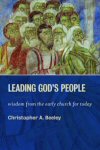
Using the wisdom of the past to address the challenges of the present, Christopher Beeley’s Leading God’s People presents key principles of church leadership as they were taught by great pastor-theologians of the early church, including Gregory of Nazianzus, Ambrose, Augustine, Chrysostom, and Gregory the Great.
In a religious climate where language about leadership is often regarded as basically a matter of secular managerial intrusion into theology, it is wonderful to have a book like this that roots our thinking about the calling of the Christian leader in the wisdom of the early church. This learned, readable, and very timely book deserves a very warm welcome.
—Rowan Williams, archbishop, Canterbury
A foundational and systematic description of the model of leadership in the early Christian community. The author weaves throughout his book excerpts from the epistles of St. Paul and the writings of the church fathers to illustrate that these early theologians understood the essential need for pastoral virtue, humility, holiness, and inspired preaching for effective church leadership. In particular, St. Augustine’s insights are very compelling. Leading God’s People serves as an instructional and meditative companion for clergy members, seminarians, and lay ministers who desire to faithfully exercise their church authority in the most representational manner of Christ’s pastoral shepherding of his flock.
—Daniel Cardinal DiNardo, archbishop, Galveston-Houston
This is a wonderful book, based upon Christopher Beeley’s deep love and knowledge of the great fathers of the church, East and West, as well as the practice of ministry within the church. . . . Provides solid guidance to all who are interested in the practice of Christian leadership, both lay and ordained.
—John Behr, dean and professor of patristics, St. Vladimir’s Seminary
Christopher A. Beeley is the Walter H. Gray associate professor of Anglican Studies and Patristics at Yale Divinity School and Berkeley Divinity School at Yale. An Episcopal priest with full-time parish experience, he is also the author of Gregory of Nazianzus on the Trinity and the Knowledge of God, for which he won a John Templeton Award for Theological Promise.

This Odd and Wondrous Calling offers something different from the many books available on ministry. It is a book both honest about the challenges of the vocation and reflective of its joy from two people still pastoring.
Anecdotal and extremely readable, the book covers a diversity of subjects revealing the incredible variety of a pastor’s day. The chapters move from comedy to pathos, story to theology, Scripture to contemporary culture. This Odd and Wondrous Calling is both serious and fun and is ideal for those who are considering the ministry or who want a better understanding of their own minister’s life.
One of the most human and most helpful books on ministry that I know. With moving, often humorous stories Lillian Daniel and Martin Copenhaver open windows onto the major and the mundane in the life of a minister—shaking hands at the door, navigating a clergy marriage, handling money, visiting the hospital. Here is ordained ministry in all its depths, its ordinariness, and its joys.
—Samuel T. Lloyd III, dean, Washington National Cathedral
My dictionary doesn’t have enough enthusiastic adjectives for this book, which I adore . . . Everyone who loves the church or struggles with the church or is just plain curious about the church will relish every page.
—Lauren F. Winner, assistant professor of Christian spirituality, Duke Divinity School
Honest, wise, deeply personal, profoundly theological, and—what’s more—delightfully written.
—Thomas G. Long, Bandy Professor of Preaching, Candler School of Theology, Emory University
Lillian Daniel is the senior minister of First Congregational Church in Glen Ellyn, Illinois, and a host of the Chicago-based television program 30 Good Minutes. She is also the author of Tell It Like It Is: Reclaiming the Practice of Testimony.
Martin B. Copenhaver is senior pastor of Wellesley Congregational Church in Wellesley, Massachusetts.
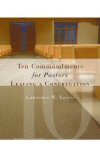
Pastoral transitions can be fraught with pitfalls, yet there is advice that can help ministers and congregations avoid those dangers. Lawrence Farris, a pastor who himself has left three churches, here gives 10 wise, thoughtful commandments for shepherds leaving their flock. Hardly heavy-handed dictums, these “commandments” are more gospel than law, laying out helpful strategies in such areas as recognizing when to depart, patching broken relationships, and enabling the next pastor to make a clean start.
While many may dream of a comfortable, long-term pastorate, today’s congregational realities make the wisdom in this book relevant for pastors in churches big and small, liberal and conservative. Perfect for pastors soon to depart and for those happy to stay put for now, Ten Commandments for Pastors Leaving a Congregation provides welcome guidance to both pastors and parishioners facing this hopeful and challenging transition.
Offers practical wisdom for the leaving process . . . A must read for every pastor.
—Enrichment
Lawrence W. Farris has served churches in Maryland and Michigan, and is currently interim pastor of First Presbyterian Church of Ann Arbor, Michigan.
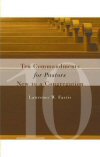
The opening months of a new pastorate are decisive for how that ministry will unfold, so great care should be taken to begin wisely and well. Simply transplanting programs and habits that worked elsewhere, ignoring the specific dynamics of the new congregation and its people, making too few significant changes, or making too many insignificant changes will create problems for the new pastor that may never be overcome. Ten Commandments for Pastors New to a Congregation offers specific, down-to-earth principles and guidance on how to make a good beginning, one that will lay the foundation for years of fruitful ministry.
Drawing on 25 years of parish ministry, during which he has mentored many new and transitioning pastors, Lawrence Farris here provides 10 guidelines, illustrated with relevant examples that identify potential pitfalls and show how to avoid them. Such areas as preaching, pastoral care, self-care, community and denominational commitments, and role clarity are addressed with an emphasis on practical approaches to ministry in a new setting. Farris also gives clear advice on how to learn the new congregation and its setting, how to set appropriate personal and professional boundaries, and how to stay focused on what matters most in a new ministry.
Lively, practical, and brief enough for the new pastor to have time to actually read it, Ten Commandments for Pastors New to a Congregation is a must-read both for pastors on the move and for individuals preparing for first-time ministry.
Practical and wise. I gladly recommend it to pastors, both new and seasoned, and seminary students as they prepare to enter a first pastoral charge . . . It is full of wise and trustworthy counsel.
—Congregations
A quick read for a population of pastors-in-transition who ought to be craving resources that raise good questions and spark new ideas.
—Princeton Seminary Bulletin
Lawrence W. Farris has served churches in Maryland and Michigan, and is currently interim pastor of First Presbyterian Church of Ann Arbor, Michigan.
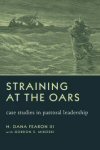
A common complaint of recent seminary graduates is their lack of preparation in practical theology, especially in the tasks of leadership. New pastors encounter a host of challenges that can seem overwhelming.
Biblically oriented, wise, and reassuring, Dana Fearon presents 21 difficult situations that young ministers are likely to face on the job, including prayer in the hospital room, a request to baptize a dead infant, handling conflict and criticism, entering dangerous areas to reconcile hostile groups, and others. As part of his discussion, Fearon presents and reviews his own response to such situations, using his theological education and long experience in church ministry to instruct others.
This book is a treasure, written out of a lifetime of faithful and very effective ministry, full of hard-earned wisdom, grace, and practical insight. I wish I had read this book years ago.
—John Buchanan, former pastor, Fourth Presbyterian Church, Chicago
With a theological depth that could only come from decades of experience, Dana Fearon offers insight and reflection on the expected challenges of ministry and on some that no one could have ever anticipated. Rarely have I come upon a work that so resonates with my life as a pastor. After reading this, pastors will start thinking about even the most mundane realities of pastoral leadership in a freshly theological way.
—David A. Davis, pastor, Nassau Presbyterian Church
Honest, humble, wise, discerning, thoughtful, evocative, accessible. . . . Though written for the recently ordained, these reflections also have much to teach those of us who have been ‘straining at the oars’ for decades as well as the seminarians we supervise, the officers we train, the adults we teach, and the congregations we serve.
—Cynthia A. Jarvis, minister, The Presbyterian Church of Chestnut Hill
Why didn’t the seminary teach us the things we needed to know? Stirred by that enduring question, this gem of a book offers wise and faithful reflections on pastoral leadership and pastoral life. Exploring numerous pastoral situations and challenges, it aptly points to the necessary partnership between seminaries and faith communities for the education and formation of their leaders—a never-ending process.
—Allan Hugh Cole Jr., Nancy Taylor Williamson Distinguished Chair of Pastoral Care, Austin Presbyterian Theological Seminary
H. Dana Fearon III is pastor emeritus of the Presbyterian Church of Lawrenceville, New Jersey, and was a longtime guest lecturer at Princeton Theological Seminary.
Gordon S. Mikoski is associate professor of Christian education at Princeton Theological Seminary and editor of Theology Today.
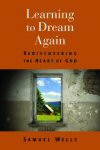
Through a series of short, thoughtful meditations, Learning to Dream Again shows what true wisdom—wisdom shaped by Jesus’ earthy humility, shameful suffering, and effervescent joy—might look like for Christians today. Through the lens of this Christian wisdom, Samuel Wells addresses a number of difficult personal and social issues, including taxes, abortion, torture, hunger, and Christian engagement with broader culture in the arts, sciences, athletics, and medicine.
Beautifully written and extraordinarily insightful, Learning to Dream Again is both for Christians who have been to church for years but long to ponder the ambiguities and hard questions of faith and life and for new Christians who are just beginning to investigate how the Gospel connects to their most searching questions.
It is impossible to read this commanding book without being put on the spot and recalled to Jesus’ teaching with new authenticity. Sam Wells is a rare preacher and teacher who tugs at the heart as much as he snags at the critical intelligence of the reader who seeks for truth.
—Sarah Coakley, Norris-Hulse Professor in Divinity, Murray Edwards College, University of Cambridge
With self-deprecating humor, Wells disarms us just enough to get us to consider the most counter-cultural matters of faith—like why wisdom is unfashionable, how shame can play a useful role in our lives, and why discipline may do us more good than relentless self-expression. . . . He guides us out of our own egos and into a dazzling divine reality where learning and dreaming meet.
—Lillian Daniel, national speaker and writer
Samuel Wells has written a book so searching, so winsome, so wise that it will find your heart and dwell there. A beautiful piece of work.
—Cornelius Plantinga Jr., senior research fellow, Calvin Institute of Christian Worship, Calvin College
This very wise and moving book about renewal, identity, and the hopeful shape of the Christian life is a rare accomplishment. Wells helps us to think deeply about the ordinary round of life—relationships, marriage, work, leisure, politics, death—while at the same time encouraging us to lift our sights and to dream again, even the dream of God.
—Thomas G. Long, Bandy Professor of Preaching, Candler School of Theology, Emory University
Samuel Wells is Vicar of St. Martin-in-the-Fields, London, and visiting professor of Christian ethics at King’s College, London. He was formerly dean of Duke Chapel and research professor of Christian ethics at Duke Divinity School. His previous books include Be Not Afraid: Facing Fear with Faith and Power and Passion: Six Characters in Search of Resurrection.

In Blessings of the Burden Alan R. Burt shares his heart for people who are homeless. Full of personal stories drawn from almost two decades of first-hand experience working with the homeless, this book is a passionate plea for greater community involvement in confronting the pressing social problem of homelessness.
Unfolding in five parts, Blessings of the Burden includes Burt’s own journey from apathy to advocacy, a moving interview with a formerly homeless man who is now the director of an organization that fights homelessness in Cape Cod, Burt’s analysis of the fourteen main reasons why homelessness is such a massive problem in America, and an example of how one community developed an innovative and cost-effective approach to helping the homeless among them. Powerful and compelling, Blessings of the Burden will inspire readers to get involved with the homeless and to become advocates for their needs, believing that they can make a difference in their communities.
Blessings of the Burden is a heartfelt reflection on the plight of the homeless in America. In this touching personal account of his own work with homeless people, Alan Burt gives voice to the voiceless among us—people we all too often ignore and neglect. Woven into this compilation of stories is a perceptive analysis of the forces that cause homelessness as well as prayers and lessons about what ordinary people like us can do. May this slim volume find a broad readership.
—Steven Bouma-Prediger, professor of religion, Hope College
Alan Burt’s journey, his message, and his ability to translate conviction into action are an inspiration. He is proof positive that individuals with faith, vision, and commitment can make profound differences in the lives of individuals and communities.
—Dan Wolf, Massachusetts State Senator
The remarkable story of care and advocacy for the homeless on Cape Cod is inextricable from the life and witness of Alan Burt. Readers will be drawn into the sorrows and joys of the real people who are his companions on a shared journey. . . . A model of ministry for other communities.
—Gabriel Fackre, Emeritus Abbot Professor of Christian Theology, Andover Newton Theological School
People of faith who seek solutions to the moral disgrace of homelessness, who want to move from servicing homelessness to solving the problem, will benefit from this story.
—Philip F. Mangano, president and CEO, American Round Table to Abolish Homelessness
Alan R. Burt is a state-licensed social worker who has been advocating for and working with the homeless since 1993 in Cape Cod, Massachusetts.

Offering a new look at the increasingly unfashionable institution of marriage, Geoffrey Bromiley presents here a timely theological study which, unlike others books on marriage, aims exclusively to relate marriage to God as creator, Son, and Holy Spirit. Bromiley observes that God’s work of reconciliation makes it possible for his people also to achieve reconciliation with one another, particularly in the marriage relationship.
In addition to thoroughly discussing the relationship of the Trinity to marriage, Bromiley examines such topics as incest, adultery and fornication, celibacy, the permanency of marriage, and remarriage after the death of a partner.
I am very pleased with the book and feel it will fill a very special place in the available literature on Christian marriage . . . It stands apart from the superficial writing that all but characterizes our time. How-to books are of little value apart from the basic theological understanding which must precede them. This is a book I would like to have written . . . Will be required reading for my students.
—Thomas Howard, professor of history, Gordon College
Bromiley pays close, cautious, and sensitive attention to virtually every scriptural passage about marriage, even the passages that are particularly difficult for our own era to cope with. He makes no attempt to rewrite the Bible in the interest of some specially modern idea. Rooted deeply in the immeasurable principles of creation and redemption, this book is full of sane, courageous, sound teaching.
—Dwight Small, emeritus associate professor of sociology, Westmont College
Geoffrey W. Bromiley (1915–2009) was professor emeritus of church history and historical theology at Fuller Theological Seminary in Pasadena, California. He is best known as the translator of numerous theology texts, including The Theological Dictionary of the New Testament, Abridged in One Volume. He is also the editor of International Standard Bible Encyclopedia and coeditor of Barth’s Church Dogmatics.

In this book, Addison Hodges Hart articulates some crucial questions for contemporary Christians: What sort of church must we become in today’s post-Christendom world, where we can no longer count on society to support Christian ideals? What can we salvage from our Christendom past that is of real value, and what can we properly leave behind? How do we become “strangers and pilgrims” once more, after being “at home” in Christendom for so long?
Summoning readers to wise and faithful discipleship in our post-Christendom age, Hart suggests both how Christ’s disciples can say “yes” to much that was preserved during the age of Christendom and why they should say “no” to some of the cherished accretions of that passing epoch.
This excellent book is both clear and courageous! It describes the fundamental changes that must take place for re-forming the Christianity that most of our denominations have accepted as the only available model of church. Addison Hodges Hart honors history, Scripture, and theology—and puts them together very wisely.
—Richard Rohr, founder, Center for Action and Contemplation, Albuquerque, New Mexico
Thoughtful Christians often lament that our leaders are characterized by ignorance on fire on the one hand and intelligence on ice on the other. In Addison Hodges Hart, however, we have intelligence on fire. In Strangers and Pilgrims Once More he makes bold and sensible proposals for a positive and robust Christian discipleship. I have great respect for this author and this book.
—Brian D. McLaren, author, We Make the Road by Walking
Addison Hodges Hart is a retired pastor and college chaplain presently living in Norway. He is also the author of The Ox-Herder and the Good Shepherd, Taking Jesus at His Word, and The Yoke of Jesus.

Respected scholar Luke Timothy Johnson challenges Christians to change the way they regard their worldly goods. He writes, “this book is written as an exercise in theological reflection on one of the knottiest questions imaginable: the connection between being a Christian and the way we own and use things. . . . When we turn to thinking about money and possessions, we find ourselves in murky waters. The things we own and use, like our sexuality, lie close to the bone of our individual and collective sense of identity.”
Stepping purposefully into the “murky waters” of owning and sharing, Johnson endeavors to define the slippery concept of human possession—especially in relation to God’s divine ownership—and to unpack the Bible’s teaching on the mystery of human possessing and possessiveness.
This second edition, reflecting 30 years of Johnson’s further thinking on the subject, features chapters expanded with fresh insights, helpful new study questions, and a substantial new epilogue.
All who found in Luke Johnson’s treatment of possessions as part of the mystery of human existence a deeper and more fruitful approach to the ‘problems’ of wealth and poverty will find in this new edition continued critical reflection and fresh insight. Those for whom this is a first encounter will find out what made it worth reissuing after 30 years.
—Sondra Ely Wheeler, Martha Ashby Carr Professor of Christian Ethics, Wesley Seminary
Luke Timothy Johnson is R.W. Woodruff Professor of New Testament and Christian Origins at Candler School of Theology, Emory University. His books include The Creed: What Christians Believe and Why It Matters and Brother of Jesus, Friend of God: Studies in the Letter of James. He is the winner of the 2011 Grawemeyer Award in Religion for his Among the Gentiles: Greco-Roman Religion and Christianity.
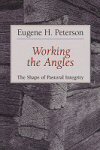
According to Eugene Peterson, American pastors are abandoning their posts at an alarming rate. They are not leaving their churches and getting other jobs. Instead, they have become “a company of shopkeepers, and the shops they keep are churches.” Pastors and the communities they serve have become preoccupied with image and standing, with administration, measurable success, sociological impact, and economic viability.
In Working the Angles, Peterson calls the attention of his fellow pastors to three basic acts—which he sees as the three angles of a triangle—that are so critical to the pastoral ministry that they determine the shape of everything else. The acts—prayer, reading Scripture, and giving spiritual direction—are acts of attention to God in three different contexts: oneself, the community of faith, and another person. Only by being attentive to these three critical acts, says Peterson, can pastors fulfill their prime responsibility of keeping the religious community attentive to God.
A good book to help us all be attentive to God in our practice.
—Sharing the Practice
Ministers sweating it out on the front line should not miss it.
—Expository Times
A provocative book. Peterson offers a stimulating challenge to much current pastoral practice. . . . His writing has the unmistakable ring of truth.
—Theology Today
Eugene Peterson is a prophet. Like the words of most prophets, his criticisms of his peers in the clergy are not easy to take, but when one considers carefully his positive statements the rightness of his speech can be recognized. . . . This is a book that is hard to put down, but the reader must stop every so often to consider what it is saying. it is not a book which can easily be forgotten.
—The Clergy Journal
Eugene H. Peterson was a longtime pastor and is professor emeritus of spiritual theology at Regent College, Vancouver, British Columbia. His many other acclaimed books include Tell It Slant, The Jesus Way, Eat This Book, and the contemporary translation of the Bible titled The Message.

In this book, William A. Dyrness explores the relationship between the biblical gospel and American culture. He shows how three dominant American cultural values—pragmatism, optimism, and individualism—have both a positive and negative impact on our Christian discipleship, looks at Walter Rauschenbusch and Robert Schuller as case studies, and sets out a distinctively American way of appropriating the gospel.
This is a profound study of how the gospel relates to the North American context. Dyrness combines cross-cultural sensitivities with theological astuteness and a solid grasp of American experiences and traditions. His brief analysis of Robert Schuller’s ‘contextualized message’ is simply brilliant! I recommend this book with much enthusiasm.
—Richard Mouw, former president, Fuller Theological Seminary
As an astute observer of American culture and an able theologian, Dyrness brings the biblical text to bear on the modern context. A learned work with evangelical power.
—Gabriel Fackre, Abbot Professor of Christian Theology Emeritus, Andover Newton Theological School
An illuminating survey of the interaction between the gospel and American society through the centuries and an assessment of their present relations.
—Lesslie Newbigin, author, Foolishness to the Greeks: The Gospel and Western Culture
William A. Dyrness is professor of theology and culture at Fuller Theological Seminary. His books include Reformed Theology and Visual Culture, Senses of the Soul, and A Primer on Christian Worship.
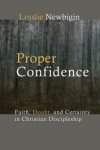
Looking to end the divisive conflict that has raged between Christians who attack each other either as “liberals” or as “fundamentalists,” Newbigin here gives a historical account of the roots of this conflict in order to begin laying the foundation for a middle ground that will benefit the Christian faith as a whole. What results is a perspective that allows Christians to confidently affirm the gospel as public truth in our pluralistic world.
A masterful demonstration of the bankruptcy of secularism and all forms of Christian accommodation to it.
—Books & Culture
Whatever Lesslie Newbigin writes is well worth reading and worth reading well. . . . With a breathtaking grasp of the history of Western thought, Newbigin proves the roots of the current dialectic between liberalism and fundamentalism.
—Presbyterian Outlook
This is an important book for pastors and teachers serving in church settings where the temptation to soften the scandal of the cross is present or where the good news, for all its outward acceptance, is thought (deep down) to be a source of embarrassment. . . . The book is beautifully written, a powerful statement of faith in God, whose incarnation has changed the nature of human life forever and whose call to the church cannot be altered by the temptation to believe that the human being is the center of the universe.
—Princeton Seminary Bulletin
Lesslie Newbigin (1909–1998) was born in Newcastle-on-Tyne in the United Kingdom. He studied at Cambridge and served as staff secretary of the Student Christian Movement in Glasgow, Scotland. He studied theology at Westminster College and was ordained by the Presbytery of Edinburgh, Church of Scotland, in 1926.
In 1947, Newbigin was consecrated bishop in the Church of South India. He also served on the Central Committee of the World Council of Churches. In 1959 Newbigin became the general secretary of the International Missionary Council. He oversaw the final negotiations for the merger with the World Council of Churches. In 1962, Newbigin became the first director of the Division of World Mission and Evangelism, and associate general secretary of the World Council of Churches. He was recalled as Bishop by the Church of South Indian in 1965, where he stayed until his retirement in 1974.

How should Christians live in a material world? Should personal guilt accompany financial success? Is wealth incompatible with true Christianity? In The Good of Affluence John R. Schneider reopens the debate over the proper Christian attitude toward money, arguing that Scripture supports the responsible possession of wealth.
This is a provocative book of Christian theology, written to help people seeking God in a culture that has grown from modern capitalism. By comparing classic Christian teaching on wealth with the realities of our modern economic world, Schneider challenges the common presumption that material affluence is inherently bad. His careful interpretation of Scripture narratives—creation, exodus, exile, and more—shows that abundance is the condition that God envisions for all human beings and that faithful persons of wealth are part of this plan.
Through insightful engagement with the biblical text Schneider overturns some of the most cherished and unquestioned assumptions of influential Christian writers (particularly Ronald Sider) on modern capitalist affluence. Yet Schneider’s message is also finely balanced with the need for responsible Christian living. He offers wealthy Christians biblical affirmation, but also challenges them to a life shaped by an uncommon sense of stewardship, generosity, and compassion.
Incisive, thought-provoking, and biblically grounded, The Good of Affluence is a superb resource for anyone—students, professors, businesspeople, general readers, discussion groups—wishing to grapple seriously with the subject of faith and wealth.
John R. Schneider is professor emeritus of religion and theology at Calvin College. He was formerly professor of religious studies at Westmont College, California. He has written widely on Christianity and wealth, and is the author of Philip Melanchthon’s Rhetorical Construal of Biblical Authority and Godly Materialism: Rethinking Money and Possessions.

Pop worship music. Falling in love with Jesus. Mission trips. Wearing jeans and t-shirts to church. Spiritual searching and church hopping. Faith-based political activism. Seeker-sensitive outreach. These now-commonplace elements of American church life all began as innovative ways to reach young people, yet they have gradually become accepted as important parts of a spiritual ideal for all ages. What on earth has happened?
In this volume, Thomas E. Bergler traces the way in which, over 75 years, youth ministries have breathed new vitality into four major American church traditions—African American, Evangelical, mainline Protestant, and Roman Catholic. Bergler shows how this “juvenilization” of churches has also led to widespread spiritual immaturity, consumerism, and self-centeredness, popularizing a feel-good faith with neither intergenerational community nor theological literacy. Bergler’s critique further offers constructive suggestions for taming juvenilization.
One of the key themes within the American church since the 1930s—and particularly since the 1960s—has been the change in how congregations approach youth ministry and youth culture. The Juvenilization of Christianity by Thomas Bergler explores the wide-ranging ramifications of this revolution across the denominational spectrum, examining not only its impact upon young people but also the larger implications—positive and negative—for the entire church. Anyone really trying to understand the dynamics of American Christianity must read this book.
—Larry Eskridge, associate director of the institute for the study of American evangelicals and guest faculty, Wheaton College
The Juvenilization of American Christianity provides a fine history of one of the most significant revolutions in twentieth-century Christianity. . . . Anyone concerned with the church and its ministries can learn from reading this book and reflecting on the changes that Bergler describes.
—George Marsden, professor of history emeritus, University of Notre Dame
In exploring previously unexamined relationships between youth, politics, culture, and Christian traditions, Bergler greatly enriches our understanding of Christian youth programs and American religious history.
—Rebecca de Schweinitz, professor of history, Brigham Young University
A fascinating exploration of the places where Christianity and youth culture have intersected. . . . Will certainly be provocative both for the casual reader and for clergy, who may also appreciate the book’s practical suggestions toward a solution.
—Publishers Weekly>
Juvenilization is a long-overdue call to question our means, methods, and message. . . . Bergler shakes us awake and helps us see what’s really happening in our youth ministries and churches.
—Walt Mueller, Center for Parent/Youth Understanding
Thomas E. Bergler is professor of ministry and missions at Huntington University, Huntington, Indiana, where he has taught youth ministry for 10 years. He also serves as senior associate editor for The Journal of Youth Ministry.
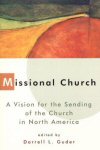
What would a theology of the Church look like that took seriously the fact that North America is now itself a mission field? This question lies at the foundation of this volume written by an ecumenical team of six noted missiologists—Lois Barrett, Inagrace T. Dietterich, Darrell L. Guder, George R. Hunsberger, Alan J. Roxburgh, and Craig Van Gelder.
The result of a three-year research project undertaken by The Gospel and Our Culture Network, this book issues a firm challenge for the church to recover its missional call right here in North America, while also offering the tools to help it do so.
The authors examine North America’s secular culture and the church’s loss of dominance in today’s society. They then present a biblically based theology that takes seriously the church’s missional vocation and draw out the consequences of this theology for the structure and institutions of the church.
This stimulating volume challenges its readers to re-examine two fundamental concepts: their understanding of the nature of the church and their understanding of mission. . . . This book is a must-read not only for missiologists but also for pastors and anyone interested in the renewal and revitalization of the church as it enters a new millennium.
—Missiology
This is a book worthy of study and consideration, especially for those who take seriously the changes that have impacted culture and church in North America. It is a provocative work that pleads for significant renewal of ‘Communities of the Holy Spirit’ in face of established institutions that have become accommodated to the American way of life.
—Interpretation
Darrell L. Guder is Henry Winters Luce Professor of Missional and Ecumenical Theology at Princeton Theological Seminary.
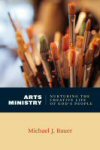
First United Methodist Church in Augusta, Georgia, gives concerts to raise money for local service organizations. Trinity Lutheran Church in Mission, Kansas, has been sponsoring a religious art show for more than 25 years. Fellowship Lutheran Church runs a Christian arts camp for young people every summer. These are just three of the 18 case studies of practicing arts ministries in Arts Ministry, in which Michael Bauer encourages the nurture and support of all the creative gifts of God’s people.
Bauer lays a solid foundation for arts ministry, grounding it in the historic Christian tradition and urging churches to expand their engagement with the creative arts—“to live and worship in full color,” as he puts it. A concluding chapter clearly lays out how to develop an arts ministry, helping readers to take these ideas from theory to practice, to embrace and celebrate the continuing creative activity of God in the church.
This volume is the best available guidebook to the emerging field of Christian arts ministry. Michael Bauer lays a solid foundation for arts ministry, grounding it in the historic Christian tradition and urging churches to expand their engagement with the creative arts—‘to live and worship in full color.’ Eighteen illustrative case studies help round out Bauer’s rich discussion.
—John D. Witvliet, director, Calvin Institute of Christian Worship
There are remarkably few books on arts ministry in the local church, and very few of them do justice to the sheer diversity of expression such ministry can manifest. Ecumenical and warmhearted, practical and positive, Bauer’s book will provide great encouragement to churches on the ground.
—Jeremy Begbie, Thomas A. Langford Research Professor of Theology, Duke University
This is an unprecedented exposé on arts ministry—what it is, how it works, and why it succeeds. With unblinking, erudite analysis, Michael Bauer elucidates the meaning that is mediated through arts ministries. His myriad examples are richly ecumenical and resourceful in their capacity to captivate mind, body, and spirit. This must-read book will convince even the disinterested. Through this work Bauer succeeds in undergirding a nationwide movement.
—Catherine Kapikian, founder and director emeritus, Henry Luce III Center for the Arts and Religion, Wesley Theological Seminary
For anyone wanting to explore the field of arts ministry, this book is a superb and remarkably comprehensive primer. Whether readers are most interested in the theological, aesthetic, or practical aspect, they will discover a solid foundation along with a generous list of resources for further study and application. Best of all, Michael Bauer’s perspective is a refreshing antidote to the frequent laments I hear about the current ‘decline of artistic standards’ in the church. . . . Bauer’s enthusiasm for the work of the Spirit in the church today is contagious! I recommend this book heartily to professional artists, clerics, and laypersons alike.
—Stephan Casurella, director of music, Christ Church Cathedral, Cincinnati
Michael J. Bauer is professor of organ and church music at the University of Kansas. In addition to his university work he has served on the music staff of 12 different churches and established arts ministries at three of those churches.

This fifth Missional Church Series volume seeks to bring historical clarity, biblical and theological substance, and practical guidance to church planting. The nine contributors—many of them experienced church-planting pastors—offer diverse yet cohesive perspectives on the Spirit’s missional church planting in our time.
Section One presents three essays which address missional church planting as a theological practice, with particular attention given to the activity of the Holy Spirit within the context of God’s Trinitarian life. Section Two grounds church planting initiatives in the generative soil of story. The two essays in this section narrate how specific congregations provide glimpses of the Holy Spirit in action, supplying the reader with hints for how history might lead to future expectations of the Holy Spirit’s ongoing church planting activity.
Three essays in Section Three focus on new frontiers appearing on the church planting horizon, and an epilogue provides a sermon which orients church planting efforts in witness that flows from the heart of God. In this book readers will find fresh insights into an exciting new future created and led by the Spirit.
Finally—the absolutely necessary conversation between missional theology, church planting, and the divine agency of the Holy Spirit! Those who plant new churches, or facilitate those plantings, or educate and mentor planters, dare not miss a careful reading of this fresh articulation of what is happening as the Spirit births new churches and what that means.
—George R. Hunsberger, professor of missiology, Western Theological Seminary
Missional theology seeks to center every theological discipline on the missional vocation of the church as an outworking of the missionary nature and action of the triune God. This collection of essays addresses the theology and work of the Holy Spirit in the formation of witnessing congregations. It should be welcomed as a constructive resource for a much-needed missional pneumatology.
—Darrell Guder, Henry Winters Luce Professor of Missional and Ecumenical Theology, Princeton Theological Seminary
Mary Sue Dehmlow Dreier is associate professor of pastoral care and missional leadership at Lutheran Theological Southern Seminary in Columbia, South Carolina, and an ordained Lutheran minister who served 25 years as a pastor in rural, suburban, and church-planting calls.
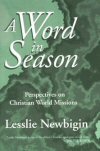
This collection of 17 never-before-published essays, sermons, and addresses by Lesslie Newbigin, one of the premier missiologists of the twentieth century, puts forth his developing view of the agenda for Christian mission from 1960 to 1992. Considered “the quintessence of Newbigin’s thought” by editor Eleanor Jackson, these papers record the dynamics of Newbigin’s ideas about mission as he confronted new issues in the church and society.
Newbigin’s sermon at Riverside Church in New York City in 1960 opens discussion on the themes of unity in mission, changes in the missionary enterprise, and developments in the theology of mission. A second group of articles addresses specific “frontline” situations: mission in the modern city, the pastor’s role in the inner city, and future of the parish church. Newbigin then moves to frontier concerns: the resistance of modern society to the gospel, the cultural captivity of the church, and the consequences of witness in a world of religious and ideological pluralism—themes central to many of his full-length books. Finally, Newbigin sets the agenda for mission as the church approaches a new millennium.
Spanning three significant decades in the history of church outreach, A Word in Season offers an important perspective on the course of Christian mission and provides valuable instruction to those who struggle with the missionary task today.
Many fresh and stimulating insights to the world Christian missionary enterprise.
—Books & Culture
A stimulating introduction to the thought world of an ecumenical giant of the twentieth century who, though past 85 and severely handicapped in sight, is nevertheless constantly producing fresh perspectives on the church, kingdom, and mission.
—Lutheran Quarterly
A helpful and thought-provoking book for every missionary and every mission administrator.
—Missiology
Lesslie Newbigin (1909–1998) was born in Newcastle-on-Tyne in the United Kingdom. He studied at Cambridge and served as staff secretary of the Student Christian Movement in Glasgow, Scotland. He studied theology at Westminster College and was ordained by the Presbytery of Edinburgh, Church of Scotland, in 1926.
In 1947, Newbigin was consecrated bishop in the Church of South India. He also served on the Central Committee of the World Council of Churches. In 1959 Newbigin became the general secretary of the International Missionary Council. He oversaw the final negotiations for the merger with the World Council of Churches. In 1962, Newbigin became the first director of the Division of World Mission and Evangelism, and associate general secretary of the World Council of Churches. He was recalled as Bishop by the Church of South Indian in 1965, where he stayed until his retirement in 1974.

Miroslav Volf’s writing beautifully points away from the pettiness and selfishness so prominent in our culture today and toward the love that Christians are called to exemplify. His insights in this volume will inform and inspire all who wish to follow that path of love.
It’s a matter of life or death: either we swim ‘against the tide’ of self-absorption or we drown; either we take God’s love as our criterion or we despair. No one but Miroslav Volf could bring this point home with such conviction, economy, and grace. For admirers of his many books on forgiveness and reconciliation, these captivating essays will be a welcome reminder. For readers just making Volf’s acquaintance, there could be no better introduction to this indispensable Christian thinker.
—Carol Zaleski, professor, Smith College
Miroslav Volf is director of the Yale Center for Faith and Culture and Henry B. Wright Professor of Systematic Theology at Yale Divinity School.
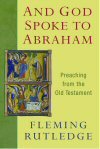
Many Christian preachers today largely neglect the Old Testament in their sermons, focusing instead on the Gospel accounts of Jesus’ teachings and activities. As Fleming Rutledge points out, however, when the New Testament is disconnected from the context of the Old Testament, it is like a house with no foundation, a plant with no roots, or a pump with no well.
In this powerful collection of 60 sermons on the Old Testament, Rutledge expounds on a number of familiar Old Testament passages featuring Abraham, Samuel, David, Elijah, Job, Jonah, and many other larger-than-life figures. Applying these texts to contemporary life and Christian theology, she highlights the ways in which their multivocal messages can be heard in all their diversity while still proclaiming univocally, “Hear, O Israel, the Lord our God, the Lord is One.”
These sermons, from one of our great preachers, are magnificent in the deepest sense of the word—serving to magnify. They enlarge and bring into sharp focus the often-neglected Old Testament. They also enlarge our vision for what preaching the Word—and hearing the Word—can mean today. In an age of fluff and bombast, Fleming Rutledge’s clear-eyed, grace-infused truth-telling is awfully good news.
—Andy Couch, editor-at-large, Christianity Today
In her sermons, Fleming Rutledge hits just the right chords of challenge, biblical fidelity, and graciousness. I love her style and her overall approach, and there is much to be learned from her specific applications.
—Philip Yancey, author, What Good Is God?
One of America’s finest preachers, Fleming Rutledge opens up the powerful words of the Old Testament as they touch our human life. I really don’t know anything else like this book, which both thinks about the place of the Old Testament in our proclamation and then puts it there, not just in a sample sermon but in a large collection, preached over many times and places. We need this book.
—Patrick D. Miller, professor emeritus of Old Testament theology, Princeton Theological Seminary
Fleming Rutledge is an Episcopal priest involved in a nationwide ministry of preaching and teaching. Her books have been celebrated across denominational borders.
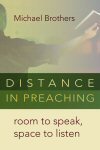
Over the last decade in his preaching classes, Michael Brothers has noticed a dramatic change in his students’ responses to preaching: as listeners, they want not so much to be drawn in to a preached sermon as to be given room for their own interpretations and experiences.
In Distance in Preaching, Brothers argues that critical and aesthetic distance as a hermeneutical tool is vital to hearing the gospel today and should be intentionally employed in sermon construction and delivery. Brothers explains this “distance” in the field of homiletics, equips teachers and students of preaching to evaluate the function of distance in sermons, and encourages preachers to practice the use of distance in their preaching. Insights gained from this book will give preachers greater room to speak the gospel so that their listeners get optimal space to hear the preached word.
Michael A. Brothers is associate professor of speech communication in ministry at Princeton Theological Seminary.
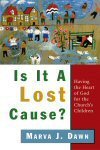
Is there a difference between children who have grown up in the church and those who have not? Why does it seem that many of the church’s young people make the same choices as the rest of the world about their sexuality, their use of money and time, their attitudes toward work, and their flippancy and cynicism? Are churches helping parents nurture and raise children with Christian faith and moral character?
Marva Dawn raises these questions in this book. Dawn challenges congregations, pastors, youth leaders and parents to take a hard look at what is happening to today’s youth. In a society where Christianity is no longer the dominant culture, the task of raising children with Christian life habits, integrity, and faith is far more demanding than ever before.
Is it A Lost Cause? is a wake-up call. Drawing on 30 years of experience working with young people, Dawn encourages congregations, pastors, and parents to embrace the church’s children with the moral authority, motivation, love, healing, hope, and home for which everyone searches. Dawn insists that we can indeed raise our children to look, act, talk, and think like people who are shaped by faith and offers specific suggestions for the necessary formation process.
This book is a must for all who have the heart of God for the church’s children.
—CBA Marketplace
Highly recommended for those who want to know why our world today is so different from that of 20 or 30 years ago . . . This one should be in every church library and on every pastor’s bookshelf.
—Trowel & Sword
Biblical . . . evangelical in tone . . . thought provoking. . . . Dawn argues that raising children with a heart for God is not a lost cause, but she avoids simplistic guidelines for parents and Sunday School teachers. . . . Helpful for any counselor who works with children or with parents who are concerned about their children’s values and futures.
—Christian Counseling Today
Marva J. Dawn is a theologian, author, musician, and educator with Christian Equipped for Ministry in Vancouver, Washington. She is also a teaching fellow in spiritual theology at Regent College.

Every church, every organization, has experienced them: betrayal, deception, grumbling, envy, exclusion. They make life together difficult and prevent congregations from developing the skills, virtues, and practices they need to nurture sturdy, life-giving communities.
In Living into Community Christine Pohl explores four specific Christian practices—gratitude, promise-keeping, truth-telling, and hospitality—that can counteract those destructive forces and help churches and individuals build and sustain vibrant communities. Drawing on a wealth of personal and professional experience and interacting with the biblical, historical, and moral traditions, Pohl thoughtfully discusses each practice, including its possible complications and deformations, and points to how these essential practices can be better cultivated within communities and families.
Every Christian should read this provocative book! Christine thoroughly delineates the interlocking relationships and dangerous deformities of practices that could deepen our communities but often destroy them. This volume is pertinent to our families, churches, even places of work.
—Marva J. Dawn, author, Truly the Community
Christine Pohl was writing about community before it was hip. So now she is cutting edge. We read her stuff when we were starting our community over 10 years ago, and it felt like she was reading our minds. Now her writing almost romantically reminds us of why we do the stuff we do. This book is great for those who are veterans of community and for those who are curious or even skeptics. Christine reminds us that we are created for, and in the image of, community—but that doesn’t mean it comes easy. This book is about the holy habits we need to cultivate if we are to experience and sustain real community. She is a wise scholar of community, but she’s also sort of a community groupie—of the best sort—she knows all the cool “bands” and has some amazing stories to tell. This new book is a gift to all of us who are longing to know that.
—Shane Claiborne, cofounder, The Simple Way
Christine Pohl’s Living into Community is truly a beautiful book. Pohl moves beyond abstractions about the church as alternative community by offering careful analysis of four core practices that sustain healthy community: gratitude, promise-keeping, truthtelling / living truthfully, and hospitality. With each of these practices, Pohl ‘goes under the hood,’ one might say, offering detailed discussions of their biblical-theological dimensions, the complications involved in attempting to practice them in contemporary western cultures, and their noxious and destructive deformations: envy, grumbling, betrayal, deception, and exclusion. This book is a worthy successor to Pohl’s groundbreaking Making Room and certainly cements her role in the contemporary Christian community . . .
—David P. Gushee, distinguished university professor of Christian ethics, Mercer University
A gem of a book—wise and practical, profound and accessible, analytical and beautiful. Too often people extol and romanticize ‘community’ without grappling with the concrete challenges of living into community and sustaining it for the long haul. But Pohl guides us into practices and commitments that transform our longing for community into what 1 Timothy calls ‘the life that really is life.’ An ideal book for lay study groups or college and seminary classes.
—L. Gregory Jones, author, Embodying Forgiveness
Christine D. Pohl is associate provost and professor of Christian social ethics at Asbury Theological Seminary, Wilmore, Kentucky.
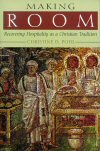
Although hospitality was central to Christian identity and practice in earlier centuries, our generation knows little about its life-giving character. Making Room revisits the Christian foundations of welcoming strangers and explores the necessity, difficulty, and blessing of hospitality today.
Combining rich biblical and historical research with extensive exposure to contemporary Christian communities—the Catholic Worker, L’Abri, L’Arche, and others—this book shows how understanding the key features of hospitality can better equip us to faithfully carry out the practical call of the gospel.
Christine D. Pohl is associate provost and professor of Christian social ethics at Asbury Theological Seminary, Wilmore, Kentucky.
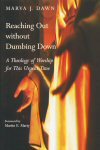
Why do churches fight “Worship Wars?” Why do discussions about how to conduct worship often split into two vitriolic polarities over “traditional” versus “contemporary” styles or into two opposing camps, such as organists/ guitarists, baby boomers/elders, returnees/loyalists or clergy/musicians? These worship wars prevent us from being the church. In Reaching out without Dumbing Down, Marva Dawn writes to help local parishes and denominations think more thoroughly about worship and culture so that they can function effectively in contemporary society. She roots her discussion of worship issues in a careful assessment of significant aspects of the present technological, boomer, post-modern society, and names criteria by which to judge the various cultural influences. She then sketches essential attributes of worship. Dawn recognizes that the vitality and faithfulness of our personal and corporate Christian lives and the effectiveness of our outreach to the world depend on the character that is formed in individuals and communities. How can churches best reach out to society without “dumbing down” this essential character formation? Dawn discusses music, preaching, and all the accouterments of worship and offers practical suggestions for choosing the best tools and forms to deepen worship life, nurture faith development, and increase believers’ outreach throughout the universal church and to the world.
Few books on worship are as articulate, thought-provoking, well researched, and prophetic as this volume . . . Dawn displays a broad awareness of the popular trends and conclusions presented in contemporary church growth literature as her quotations, discussion, and ample footnotes demonstrate.
—Bibliotheca Sacra
Dawn’s perspective on worship is refreshingly theocentric. . . . An interesting work that addresses a key topic for Christians.
—CBA Bookstore Journal
In her warmly encouraging book, Dawn explores ways that congregation members and leaders can plan appealing and accessible worship services without ‘dumbing down’ to the lowest common denominator of popular culture. . . . An especially helpful guide to the literature on church growth, authentic contemporary worship and music, and doing theology in congregations.
—Christian Century
Marva J. Dawn is a theologian, author, musician, and educator with Christian Equipped for Ministry in Vancouver, Washington. She is also a teaching fellow in spiritual theology at Regent College.
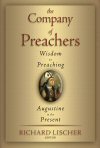
This unique volume draws on the wisdom of Christian thinkers and preachers from across the ages to present a warm and informative collection of insights on the art of preaching.
Gathering the writing of figures as diverse as Augustine, John Chrysostom, Jonathan Edwards, Gardner C. Taylor, and Barbara Brown Taylor, The Company of Preachers provides experienced advice on effective preaching, direct from the pens of those who have known it best. The book is arranged in seven divisions, each covering a central component of the preaching task. Editor Richard Lischer, himself a distinguished preacher and teacher, gives a brief introduction to each selection.
Aptly presenting a theological and historical cross-section of the church’s homiletics, this volume will be invaluable to preachers, students preparing for ministry, and others seeking models of powerful Christian speech.
As constant and recurring as preaching is in the church, it is a practice that is endlessly inscrutable in its performance. In our time of peculiar bewilderment, the sermon is especially odd in its performance and in its possible impact. Richard Lischer’s ‘reader’ on preaching is a reminder that we do not need to reinvent the wheel. Others before us and alongside us have thought well about the mystery of preaching. This valuable collection will benefit both beginners and veterans who may be at a point of rethinking. The representative voices in these pages invite such rethinking and make clear that preaching at its most faithful is not the property of any sect or perspective but stretches us all beyond our inclinations to the True Subject of such proclamation.
—Walter Brueggemann, former William Marcellus McPheeters Professor of Old Testament, Columbia Theological Seminary
A marvelous collection of essays. Richard Lischer has assembled a roomful of sparkling intellects for a cracking good conversation about preaching. He gathers thinkers from across the ages and around the world and invites them to share their wisdom on every major preaching theme. The result is a dialogue that bristles with energy, refreshes our memories, stretches our minds, and whets our appetites for more.
—Thomas G. Long, Bandy Professor of Preaching, Candler School of Theology, Emory University
A treasure house of homiletic wisdom! This superb collection can guide, inform and stimulate all who practice and value the Christian tradition of preaching, and who are concerned for its renewal today.
—Expository Times
Richard Lischer is the James T. and Alice Mead Cleland Professor of Preaching at Duke Divinity School.
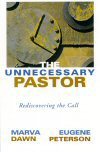
Pastors are strategically placed to counter the culture. No other profession looks so inoffensive but is in fact so dangerous to the status quo. Their weapon? A gospel that is profoundly countercultural. But standing firm in today’s world isn’t easy. Powerful forces, both subtle and obvious, attempt to domesticate pastors, to make them, in a word, unnecessary.
In this book, two of today’s most respected authors help pastors recover their gospel identity and maintain a pure vision of Christian leadership. Marva Dawn and Eugene Peterson reconnect pastors with the biblical texts that will train them as countercultural servants of the gospel. Marva Dawn looks to Paul’s letter to the Ephesians for instruction for churches seeking to live faithfully in today’s world. In turn, Eugene Peterson explores Romans, 1 and 2 Timothy, and Titus, drawing from them the correct view of pastoral identity.
Every once in a while, a book comes along that should be required reading for everyone who is in ministry. . . . If you have enjoyed previous works by Dawn and/or Peterson, you will enjoy this book as well. It is a book that draws pastors, especially closer to God and encourages us to rely more fully on his grace.
—Reformed Review
This is a rich book with much to assist both pastors and laypersons in shaping their biblical identity as countercultural servants of Jesus Christ.
—Provident Book Finder
The book’s premise is that there are three ways that pastors are unnecessary: to what the culture presumes is important, to what pastors themselves feel is essential and to what congregations insist that pastors must do and be. The Unnecessary Pastor should liberate ministers from such manmade limitations and free them to become what God has called them to be. It’s likely not only to be popular with clergy, but also clergy-to-be, as seminarians could definitely benefit from its godly insights.
—Christian Retailing
Marva J. Dawn is a theologian, author, musician, and educator with Christian Equipped for Ministry in Vancouver, Washington. She is also a teaching fellow in spiritual theology at Regent College.
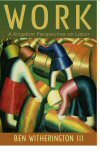
Most Christians spend most of their waking hours working, yet many regard work as at best a necessary evil—just one more unfortunate by-product of humanity’s fall from grace. Not so, says Ben Witherington, and in Work: A Kingdom Perspective on Labor, he considers work as neither the curse nor the cure of human life but, rather, as something good that God has given us to do. In this brief primer on the biblical theology and ethics of work, Witherington carefully unpacks the concept of work, considering its relationship to rest, play, worship, the normal cycle of human life, and the coming kingdom of God. Work as calling, work as ministry, work as a way to make a living, and the notably unbiblical notion of retirement—Witherington’s Work engages these subjects and more, combining scholarly acumen with good humor, common sense, cultural awareness, and biblically based insights from Genesis to Revelation.
Conducting a critical dialogue with the theological voices of our day, drawing upon the wisdom of the Christian tradition, and offering a sensitive reading of New Testament parables, Witherington delivers sound counsel on the kingdom meaning of work and its implications for our lives today.
—Lee Hardy, professor of philosophy, Calvin College
Ben Witherington has given the whole people of God something desperately needed to make sense of Monday to Friday—a theology of work that breaks down the heretical sacred-secular distinction. This book offers a work-view and life-view that, if embraced, would revitalize the mission of God’s people in the world. It’s that good.
—R. Paul Stevens, David J. Brown Professor of Marketplace Theology and Leadership, Regent College
Ben Witherington is Amos Professor of New Testament for Doctoral Studies at Asbury Theological Seminary, Wilmore, Kentucky, and is on the doctoral faculty at St. Andrews University, Scotland. Witherington has twice won the Christianity Today best biblical studies book of the year award, and his many books include socio-rhetorical commentaries on Mark, Acts, Romans, 1 and 2 Corinthians, Galatians, Philemon, Colossians, Ephesians, and 1 and 2 Thessalonians.